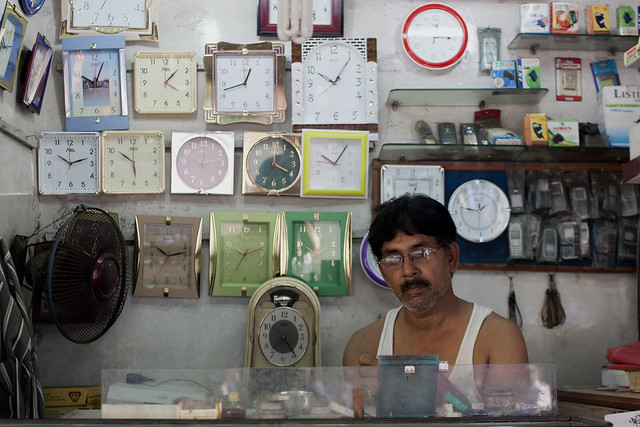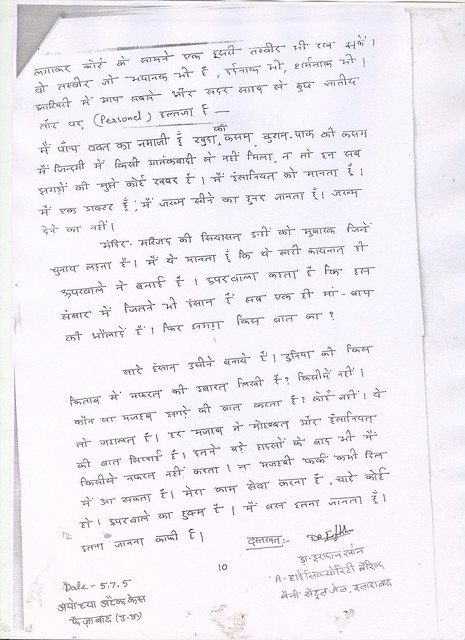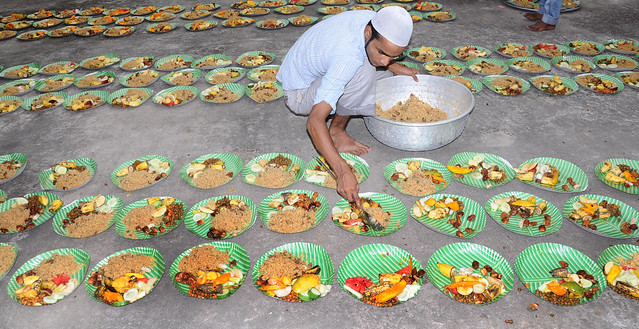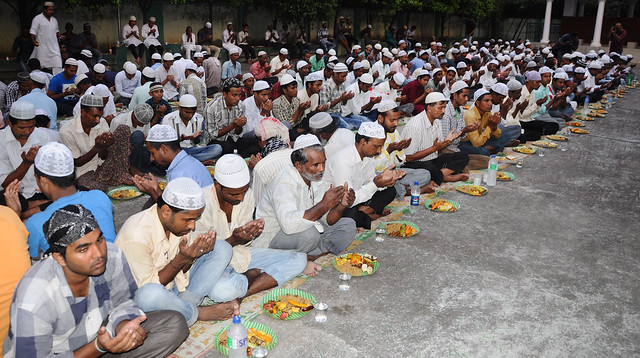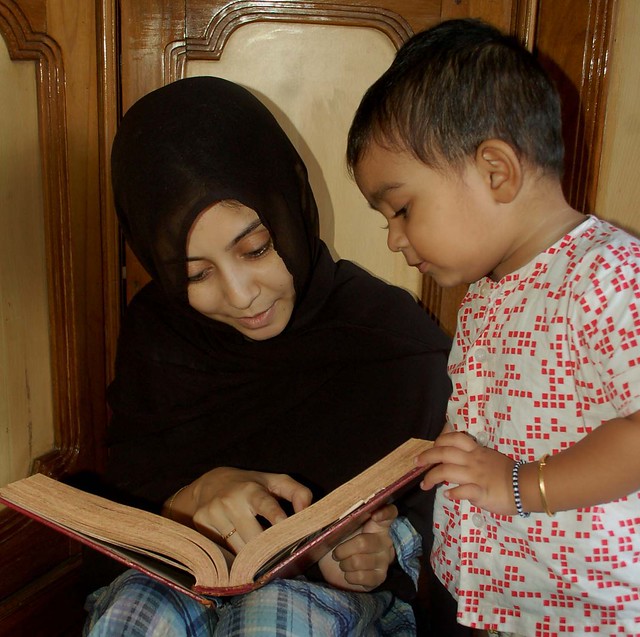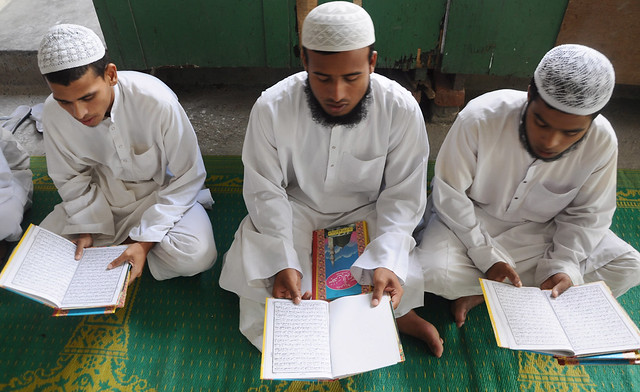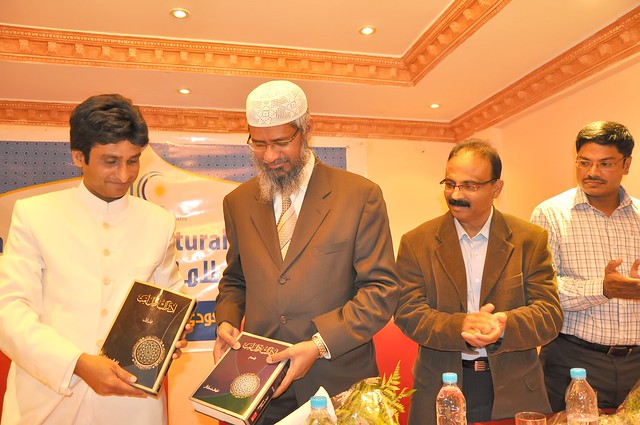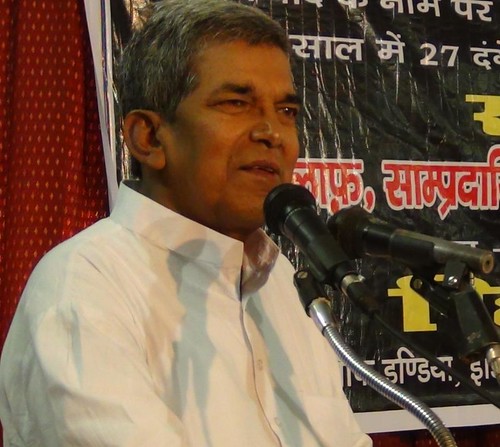By TCN News
Originally written in Hindi, this letter was first published in Urdu in Roznama Sahara which was then translated into English from original Hindi letter by UrduMediaMonitor.com.
To,
The President of India
Sir,
I, Mohammad Irfan, was born in a poor family in the town of Titron in 1974. My parents with great economic difficulties managed to get me a diploma. In 2004 I opened my clinic in Sangam Vihar in Delhi so that I could give some assistance to my poor family. The clinic got some success.
Sangam Vihar is one such area of Delhi where people from Uttar Pradesh, Bihar and from other parts of the country come and get involved in small economic activities to earn their livelihoods. Near my clinic there are many shops like tea, sweetmeat, grocery, barber, washer man, clinic and medical store etc. Not everyone in the market had a mobile phone. Residents had given the mobile number of others to their family members and relatives. Whenever someone had a phone call he was called for. This was a locality of well-behaved and gentle people who used to help each other. If the battery of someone’s mobile was down he would put his sim in someone else’s phone and let the conversation go ahead. And if balance ran out someone else’s set was used to complete the conversation. Neither I was involved in any undesirable activity nor, as far as I know, anyone else was any wrongdoer. Anyway I was a doctor and my job by the very nature was to help others.
![]()
Last page of the ten-page letter written by Dr. Irfan Khan.
In Titron, my village, there was a PCO in my name that used to be managed by my younger brother named Suhail. He was 15 years old. My father used to look after our little farmland. We had a simple and peaceful life. Then suddenly havoc engulfed all of us. In the first week of July 2005 police picked up my brother who was managing my PCO. My family contacted me on my mobile that was switched off. They then contacted my aunt in whose house I was staying. I was told that Suhail had been taken away by the police and I was asked to leave for Titron immediately. I left Delhi for Titron straight away.
My family told me that the police was looking for the person in whose name the PCO was registered. Along with my brother-in-law Ejaz Khan and other relatives I prepared to go to the CO (Circle Officer) of my area (CO Nukur). We then decided to see Samajwadi party leader Shagufta Begum first. We all went to her. Shagufta is a known social figure of the area. She knew police officers well. She phoned CO Nukur and asked why I was being called for. They talked about some other issues too. After a while two constables arrived at Shagufta’s residence one of them was Mustafa who was my acquaintance. They took me to the CO. I asked the CO Nukur why the police had held my brother. He said he had been detained by the STF (Special Task Force) in Ghaziabad and he would be released as soon as I get there. CO asked me about my mobile. I had left it at my sister’s home. CO made me talk to my sister and asked for the mobile to be brought in. It was soon brought in. The CO then called for a photographer and had me photographed. After this CO Nukur took me to Ghaziabad in his car. My brother was with the STF Ghazibad. The CO handed me to them and left back for Nukur along with my brother. I remained with STF Ghaziabad for about one week.
During this time STF officials took me to my Sangam Vihar clinic, made me open the clinic at night and took out patients register, medical equipments and money and brought me back to Ghaziabad. There some Jawala Singh (Bihar) was also present whose maternal uncle had links or hand in some terrorist attack. Upon his statement that he had lost his mobile he was given two or four slaps and was let go. Then came my turn. There was a policeman named Tyagi. He started spitting at my face. I was stripped naked, my pubic hairs were plucked and a rod was inserted in my back. I was hung upside down and water was poured into my nostrils. Candle was lit and melting wax was dropped on my penis. I cried and wailed at which they laughed. Then Tyagi brought four to five bodybuilder type lads. They might have been STF soldiers who started sodomising me. I was there for about eight to ten days during which I did not even see my clothes and was kept naked.
High ranking police officials used to come there in whose presence I used to be given this treatment. Tyagi and these lads used to urinate in my mouth and forced me to drink it. If I spat it out they would beat me mercilessly. Tyagi used to say, ‘You just keep on seeing what the STF commandos are capable of.’
Tyagi was tall and had small pox spots on his face. The other bodybuilder type lads used to do exercise in the morning and recite Hanuman Chalisa and Durga Chalisa [Hindu prayers]. They had AK 47 rifles.
STF officers picked my neighbour shopkeepers in Delhi and brought poet Ali and Aleem hairdresser from there and made me face them. The poor guys were crying in fear. Tyagi started swearing at and berating them up. All three of us were in a bad shape. Tyagi asked them to slap me and when they refused they were beaten up. They were forced to slap me 10 times each with full force. All three of us were then asked to urinate on each other’s face. They preferred to die rather than indulge in such an act. They were beaten up and then allowed to go.
Tyagi used to say, ‘We have to exterminate the katwas [circumcised i.e. Muslims] or make them flee to Pakistan.’ Swearing in my mother’s and sisters names were a routine. This was done thousands of time during the day. I was thrashed 25 times on my bald head with slippers and pretending to forget the right count Tyagi would restart beating me. My buttocks used to be reddened by being beaten with slippers too.
During this time high officials used to come or phone. Tyagi would tell them, ‘Saheb hai to kuch nahiN magar bakra hai katlo. [Sir there is nothing but we have a goat in our possession let’s slaughter it’.] This was the state I was in during the tenure of Mulayam Singh’s government considered to be the greatest Muslim-friendly leadership.
After this I was taken back to my tehseel, Nukur, my fake medical certificate was obtained from Saharanpur and I was taken to SP [Superintendent of Police] where there was a crowd of media persons. Here putting his pistol on my chest the highest ranking officer warned me, ‘If you utter a word before the media think well about it because you are going to stay with us.’ I was then presented before the court in Saharanpur. Obviously they had shown it as new arrest. From Saharanpur I was taken to Faizabad by jeep. During this journey two nights were spent in a police station. During these nights I was kept naked. From a constable to the station-in- charge everyone spat on me.
I was then presented in the Faizabd court where media and lawyers beat me brutally. With this great ordeal I reached Faizabad jail and was locked in a solitary confinement. This was a tiny cell with a toilet inside it. I was given a pitcher of water to wash. They did not clean the toilet and the stench was so strong that it made breathing difficult. I had to eat in this aura.
During this time my police remand was taken for providing arms [to the terrorists]. But I was kept naked in a police station in Faizabad and from there I was presented before the court. No one felt any shame [at this behaviour]. I remained there for three months.
Lawyer’s association boycotted pleading [for us]. Amid continuous beatings and boycott I was put in the Anda barrack of Allhabad’s Naini Central Jail.
From here started [our routine journeys] up and down to Faizabad. After 12 months without any lawyer charges were framed against me. I could not hire a lawyer and the lawyers my family sent to plead for me were chased and beaten by police lawyers of Faizabad inside the court room itself in the presence of the judge. At last they surrendered and left me to face the situation on my own.
Instead of becoming the parents’ support in their old age I had become a burden on them. A patriot had been proven a traitor. Poor parents wept and cried in helplessness. Poverty is the worst sin. How could they hire a powerful advocate? They accepted it as their fate. How they, who could not have proper food, afford to pay the fees of a wakil like Jethmalani and Tulsi to plead for me. Lawyers like them charge Rupees 10 lakh per hearing. That means in India to get justice it costs Rupees 10 lakhs per court hearing. How could a poor afford such a big amount? It is therefore sure that the poor will never get justice. In jails in India 99% of the inmates are such poor lot. All the laws [rules and regulations] are applied onto the poor.I have spent eight years in a terrifying place like Anda barrack where there is neither air, nor any water and nor any sun, everything is dark. The food I get in here is horrible even to see. But what can one do?
Outside the jail the poor parents beg and plead anyone there to help them and get their son freed from incarceration. Who would do such a thing? I myself want to know if there is any rule of law and justice in any corner of India. If it is there then I want to see it myself. India is my dear country, I have always been ready to sacrifice myself for the honour of my country… but, but, respected President, Sir, now I pray and request you to put me to death and that will be an act of mercy. It will be a great act of kindness.
What is my crime? The incident [Faizabad court blast] occurred on 5 July 2005. Some months before that someone had used my mobile phone to put his own sim in it and make a call for 2 – 3 minutes. Neither the [suspected] terrorist has been identified nor have any documents relating to his sim card been found. [And only for this] I have been kept in prison. What does the law say? What do all the judgements of the Supreme Court talk about? That for the sake of Justice an innocent person has to be saved from being punished wrongly if for that even 100 perpetrators have to be released. What is all this then? Is it what is called justice, caught a totally innocent person and destroyed his life? All of them, from the STF to the jails and the courts are all the same! Was there someone who could ask me what have I done to go through like this?
Ten judges have changed so far and with the exception of one or two all of them have treated us inhumanely. They looked at us with hate and contempt, insulted us and threatened the witnesses. Our lawyer was an ordinary practitioner (did not belong to the high group). He was not allowed to cross examine the witnesses who were mostly from the CRPF or [intelligence] agencies. They had been given previously written statements and were made to read from them for the court. The lawyer was stopped from questioning them and was told what to ask and what not to ask. This is what Indian courts are!!!
We have been accused of hatching a conspiracy. We have nothing to do with the crime scene but only witnesses of the crime kept being called. If they did not attend, summons were issued. If they failed to appear in the second hearing summons were issued again and it went on and on and years have passed. It also happened that for some six months one witness did not attend the court but the summons used to get issued. The aim is just to keep us rotting in the jail. The law says that deciding a case quickly is the right of the accused, but where is that law?
The High Court had ordered on 2nd August 2011 to finish our case within eight months. But how could it be? So many, ‘eight months’ have passed.
The dates being given are 15 to 20 days long. They say in order to inform the witnesses so much time is necessary. What are the wirelesses for then? What are the police stations in all villages for? Why the court’s each step is aimed at wasting time. Eight years have passed but to date not even a single witness has produced any evidence against us. On the contrary what appeared was in our favour. What on earth is all this drama then for?
At least in the name of humanity the Government can take following steps and by doing so at least the stigma of the ill will would somewhat be washed off:
1) Instead of sending summons [to the witnesses] they should be informed through wireless and local police station or choki should be given the responsibility of sending the witness [to attend the court]
2) After one summon direct SBW be issued
3) Wherever such cases are being tried a team should be formed at DJ level that should scrutinise witness lists and only those witnesses who have anything to do with the allegations on the accused be called. Time should not be wasted by calling unrelated witnesses.
4) Government through a writ in the High Court make all such cases time bound so that they should be decided within 90 days.
5) Supreme Court provides the facility of long parole being granted by the Government. This is Government’s jurisdiction. Why is Mulayam Singh then making unnecessary noises? What is the hindrance? Grant the parole now and see the rest of the issues later. Mulayam Singh should see this ruling of the Supreme Court and all the public see it too:
‘If the state takes up a flexible attitude it may be possible to permit long spells of parole under controlled conditions so that the suspicion that full freedom if bailed out, might be abused, may be eliminated. Humanising interludes of parole are part of the compassionate constitutionalism of our system.
1978.1 Supreme Court cases 240; before V. R. Krishna Iyer Judge, Criminal Miscellaneous Petition No: 1443/1977; decided on December 6 1977
Supreme Court is itself recommending that the government give long parole. What’s the problem then? Mulayam Singh is eyeing on Hindu vote bank too. This is the reason.
6) In such cases the government should appoint an observer who should keep an eye on the proceedings and should make sure that the witnesses attend the hearing at the date and time fixed.
7) The government should, on its own expense, call Supreme Court’s high level lawyers who should prepare guidelines to finish such cases speedily fulfilling all the demands of justice.
8) In each case grounds on which charges have been framed should be argued by these lawyers afresh. If this is done these cases will not reach to a trial stage and all of the accused will be released at this stage.
9) Social activists like Ashish Khetan should be supported by the government so that they can uncover the truth of the arrests of innocent people and thus can present before the court the other side of the picture, the picture that is ugly, disturbing, shameful and painful.
In the end I make a personal appeal to you. I pray five times a day. I swear by God and on Qur’an that I have never met any terrorist in my life nor do I know anything about these problems. I believe in humanity. I am a doctor and I know how to stitch injuries not how to cause wounds.
Let those who have to contest elections deal with the politics of mosque and temple. I believe that all of the humans have been created by the Almighty and He tells us that all humans are the issues of one mother and one father. What is the dispute is all about then?
All humans have been created by Him. Which book tells us to hate others? None of them. Which religion talks of fighting each other? None of them. This is meanness. Each religion talks of love and humanity. Even after such incidents I do not hate anyone. Nor can religious bias come into my heart. My duty is to serve whoever comes to me. This is the Order of the Creator. This is what I believe in.
Dr Irfan Khan
June 30, 2013
High security Barrack
Naini Central Jail Allahabad

